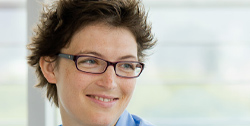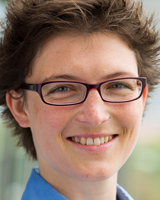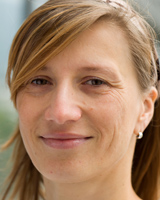Riding the Wave into the Professional World
Not all PhD students can or want to work in an academic environment. Industry offers exciting opportunities for young researchers - if they use their chances in time. Molecular biologist Aleksandra Pietrosiuk has taken that step. She received valuable support from Sandra Martini, career advisor at the Hartmut Hoffmann-Berling International Graduate.
Ms Pietrosiuk, people around here call you “Ola”, the Spanish word for wave. Does this nickname have to do with your past as a windsurfer?
Aleksandra Pietrosiuk Not a bad guess, but wrong. In Poland, Ola is the usual abbreviation for my first name Aleksandra. I gave up windsurfing when I went to university.

Has the sport taught you anything that you can use in your scientific career?
Pietrosiuk I trained daily back then, and often spent the weekends at regattas, for instance at Kieler Woche. Ever since that time, I can motivate myself really well, I like competitive situations, and I'm good at managing my time. I kind of got used to success, too. Today, I find that in the labor, one of these days, at work.
You've known for a year that you'll soon start working as a product manager at Procter & Gamble in Brussels. But you only finished your PhD thesis a few weeks ago ...
Pietrosiuk It's true, I'm the first PhD student of my supervisor's to have a job before earning her degree.

Sandra Martini Even though many others could have the same chance.
How so?
Martini Many PhD students come here without a definite idea of what they want to do afterwards. About one in three wants to pursue an academic career. But only a few will eventually become professors. We want our PhD students to know the risks, and we help them develop alternative plans if need be. People who start working in a postdoctoral position just to have time to think may end up losing valuable time.
When should PhD students take the first steps to secure their professional future?
Martini The second year of the PhD programme is ideal, that's when they have time. Later on, they are busy with conferences and publications and have to prepare for the oral part of their PhD examination.
How did Sandra Martini help you, Ms Pietrosiuk?
Pietrosiuk We met in the first semester of my PhD programme. That's when I first realised that, while I loved my project, I could imagine working outside an academic setting in the long term. In the work groups, you don't learn much about how to get into industry. Sandra organised informal meetings with pharmaceutical companies, publishing houses and consulting firms - and I kept going there until I had found what I wanted.
And then?
Pietrosiuk Then she helped me with my job application. For years I had only sent off informal scientific CVs. I didn't know how to write a good letter of application.
Martini Aleksandra did well even without my help. But in most cases, I can still offer some advice. I used to work in the human resources department of BASF, so I know what companies are looking for. I know their language, and I can intervene when PhD students only emphasise their scientific skills while neglecting to mention other strengths and their personality. I also help PhD students to better recognise their scientific preferences. Most of them can hardly tell me at the start whether they prefer practical work in the lab or writing scientific treatises, or if they're good at organising conferences or teaching students.
Pietrosiuk Well, those kinds of things don't help you with the actual PhD thesis. Strengths in communication or in organising conferences are irrelevant in that case.
Still you kept doing it.
Pietrosiuk Sure, it was fun and I wanted to develop those skills, and ultimately they made the difference in my application. People at university often imply that only those that don't make it in academics transfer to industry. That's nonsense. Companies simply look for different skills. If you have them, you might be wasting your talent at a university - and vice versa.
Do you have to educate scientists to see that, Ms Martini?
Martini Not as such; we also help PhD students find good scholarships and postdoctoral positions for an academic career. But so far our graduates are distributed pretty evenly among academic institutions, industry, consulting companies and the publishing sector - and junior scientists are beginning to see that.
Ms Pietrosiuk, what was your PhD thesis about?
Pietrosiuk I investigated the ClpV protein that supplies energy for a specific secretion system to bacteria of the type Vibrio cholerae. Secretion systems are mechanisms that bacteria use to either release substances into their environment to change it in their favour, or to transport them into other cells. ClpV uses energy from the cell to break down tube-like complexes consisting of two molecules called VipA and VipB. Only then can effector proteins like VgrG be introduced into the host cells through the cell membrane.
How does the bacterium benefit from that?
Pietrosiuk Bacteria use secretions systems “peacefully” for communication, but indirectly also in order to proliferate as much as possible. VgrG doesn't just puncture the cell membrane like a stinger, it may also deliver toxins into the host cell - such hosts could be scavenger cells in the human gastrointestinal tract, for instance. It would thereby deactivate these cells to keep them from destroying Vibrio cholerae. Then the bacterium can grow and spread at its leisure until it returns to the environment - via the diarrhoea it causes.
Are you sorry that you won't be able to continue your research project?
Pietrosiuk The fact that we now know more exactly how ClpV supplies energy for the secretion, and that it destroys these special tubes in the process, is a breakthrough, and researchers all over the world will continue working on it in the coming years. But I don't cling to this project. I'm more attached to the skills I've acquired during this period.
Short Biographies
Dr. Alexandra Pietrosiuk

Aleksandra Pietrosiuk took up her position in the research department of Procter & Gamble in Brussels on 1 September. She studied biotechnology in Gdansk (Poland) and Perugia (Italy) and conducted research for her bachelor's thesis at the German Cancer Research Center (DKFZ) in Heidelberg. She earned her master's degree from Heidelberg University and performed her PhD at the Center for Molecular Biology of Heidelberg University (ZMBH) with a thesis on a newly discovered secretion system of the Vibrio cholerae bacterium. Pietrosiuk was also enrolled in the Hartmut Hoffmann-Berling International Graduate School of Molecular and Cellular Biology (HBIGS). Between 1997 and 2003, she was a professional windsurfer, coming in second in the Polish national championship and tenth in a junior world championship.
Sandra Martini

Sandra Martini wants to help PhD students find a job as soon as possible after they earn their degree - whether in an academic or research institution or in industry. She studied adult education with a focus on on-the-job-training, Eastern European history and literature in Heidelberg and Jena, and worked as consultant and coach at BASF in Ludwigshafen. Since March 2008, Martini has set up the Career Service of HBIGS and advises PhD students on their career choices and job applications. She also organises cross-subject, professionally relevant courses and informal talks that help PhD students at HBIGS prepare for a career after school.

